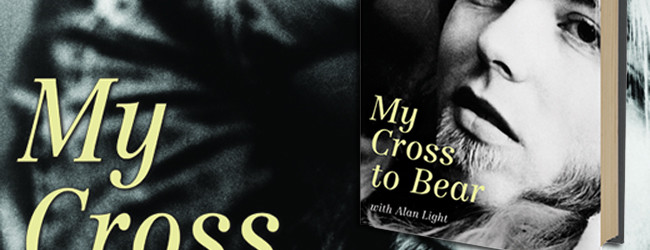
Gregg Allman’s recently released autobiography, My Cross to Bear, is essentially the first real look inside the life of the iconic musician and the inner workings and development of one of the most longstanding, genre-defining, blues-based rock & roll bands in history, The Allman Brothers. My Cross to Bear is an enlightening and unapologetic look at the turbulent lifestyle and driving force behind the band. Sometimes laugh-out-loud funny and other times heart breaking, Gregg’s down-to-earth narrative is endearing from beginning to end.
Allman takes readers through his childhood and into his career, not sparing details as he shows how his music, and life in the music industry, escalated from that of a hobby into legendary status. A great deal of the book describes the relationship between himself and his older brother, Duane Allman, who at only 24 years old tragically died from injuries sustained in a motorcycle accident in 1971. While Allman says that he regrets his last encounter with Duane, one that involved a small dispute over a gram of cocaine, the memories that he shares with readers are bursting with nothing but love and admiration for his older sibling. Having lost their father, the victim of a senseless murder, at a very young age, the Allman brothers depended on each other’s support growing up — though this didn’t stop the brotherly antics and fights that would occasionally arise between the pair.
In an impressive reminiscence of a moment somewhat famous in rock history, Gregg shares a memory of buying Duane a bottle of Coricidin and a Taj Mahal record for his birthday, leaving them outside his door that morning. Later in the evening Duane called insisting he come over immediately. When Gregg got there, Duane had peeled the label off of the bottle, poured out all the pills, placed the bottle on his ring finger and used it as a slide. Gregg fondly talks about Duane mastering the slide guitar, having practiced until he was able to play along with Jesse Ed Davis on “Statesboro Blues.”
Allman also expands on how he managed to dodge the draft in a hilarious story about the “foot shootin’ party” that Duane threw to get him out of joining the service. The brothers arranged to have the event and get Gregg drunk before he did the deed himself. Things begin to go wrong when both of them fail to remember to get a gun, among other issues. One of many unbelievably funny stories featured in the book, the outcome was at least successful in keeping Gregg out of the military and in music. At times these relayed moments are so personal that they seem almost intrusive, but the book has a casual and natural voice, lending a feeling to readers of sharing stories and laughs with an old friend.
Some of the more serious issues that Allman discusses include his drug and alcohol abuse and addiction. He talks about the first time that he and Duane tried heroin at a party, but as time passed and recreational use became more and more frequent, the brothers were pulled aside by Ahmet Ertegun and Jerry Wexler of Atlantic Records, warning them against the way they had seen artists’ careers crumble from addiction. Allman doesn’t deny or try to make excuses for his drug and alcohol abuse. He describes his alcoholism stating, “the more you drink, the more you have to drink.” He also showed a great deal of appreciation for his band mates.“The band tried every way in the world to help me, but it’s something a person’s got to do on their own.”
After facing several serious health issues, Gregg Allman is trying to take it easy, but his love for music is constantly pulling at him. “Music is my life’s blood. I love music, I love to play good music for people who appreciate it.” There is something to be said for the way the Allman Brothers Band helped mold southern rock and blues music and generating a fan base across several generations of music lovers. Allman writes, “It was once said that the blues is nothing more than a good man feeling bad, and that’s what it is. Believe me, singing a blues song makes you feel better afterwards. Singing the blues doesn’t mean that you have them at that minute—the blues usually crawl up on you late at night or early in the morning… singing is a way of letting go of it.”
A man who isn’t short on tragedy, Gregg Allman uses ‘My Cross to Bear’ to show readers how his music and life has continued to intertwine, and how he wouldn’t have done it any differently. “If somebody offered me a second chance, I think I’d have to pass on it.”


